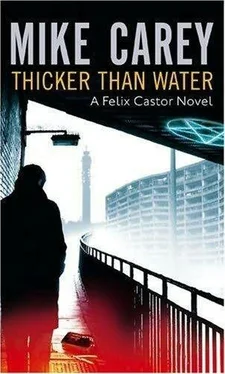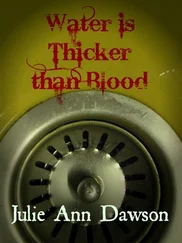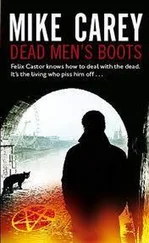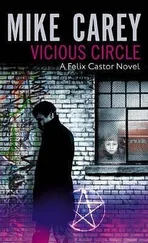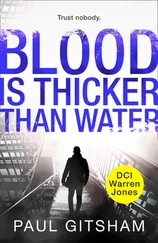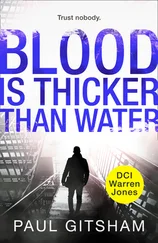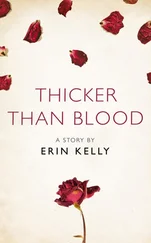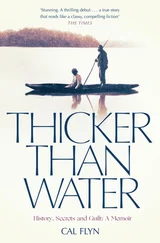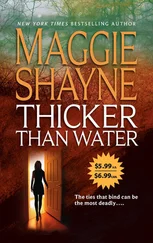But it’s a reliable rule that most hauntings have a fixed physical locus, an anchor point, where something that no longer belongs in this world has somehow got stuck and failed to move on. Finding the anchor is one of the first steps in any exorcism, because it means you can apply your leverage to the point where it’s going to have the biggest impact. It’s like aiming your fire extinguisher at the base of the fire, not at the flames.
This field of buzzing emotional energy wasn’t playing by the rules. It remained diffuse, impossible to pinpoint: my psychic compass wobbled and spun, looking for a true north that seemed not to be there.
The emotional weight that the miasma carried became more and more vivid as I approached: intensified, without narrowing down. What I was tasting in the air was a tension, a restless alertness, together with a sort of shift in my vision that made everything I was seeing subtly different — as though I was seeing it through a window that had been misted with somebody else’s breath.
I walked between the first of the Salisbury’s towers as I came off Freemantle Street, passing a primary school on my left. Kids are like dogs, too, and the two hundred or so toddlers swarming around in the playground seemed unusually subdued and thoughtful. They were playing on the climbing frames and hopscotch grids, but silently and with a disconcerting solemnity.
I looked up as the shadow of the Salisbury’s eastern-most block fell across me. The towers all had name plaques fixed to their walls at head height, the names barely visible beneath a hundred layers of granulated, half-erased graffiti: this one — the pink tower that stood at one end of the artfully arranged colour field — was Sandford Block, and its companion on my left, a slightly warmer shade of the same basic colour, was Cole. I thought of cattle brands, and of Adam naming the beasts. These hulking monsters wore their names lightly, and didn’t seem to have been tamed or humanised by them to any measurable extent.
The remaining towers stretched in a colonnade ahead of me, probably about a quarter of a mile long and two hundred feet wide. Over my head were the first of the walkways, linking the towers within a rigidly geometrical spiderweb. The floor was paved with blocks of faded rose-pink and yellow, between which weeds grew in stubborn profusion: everything else was poured concrete, forty years old now and well into its mid-life crisis. There was a shopping trolley abandoned at the foot of Cole Block, lying on its side like a dead wildebeest. There was also a small cluster of boys in their early teens who were completely ignoring me as they kicked a football against the concrete wall, taking turns to hone their ball control in solo displays that clearly had a competitive edge to them.
I checked the address that Nicky Heath had given me, scribbled on a torn-out page of Notes for Persons in Police Custody , the Home Office pamphlet they give you these days in place of the old ‘You’ve been nicked, me laddie.’ I’d asked Coldwood for the address first, but he’d warned me off even more emphatically than Basquiat had, pointing out that if I was serious about not wanting to be arrested the best thing I could do was sod off home and stay there.
‘You’re forgetting one thing, Gary,’ I pointed out.
‘Which is?’
‘I’m also serious about being innocent. I didn’t take a straight razor to Kenny Seddon’s throat. The last time I wanted to do that, I hadn’t even started to shave.’
Coldwood shook his head. ‘So?’
‘So I know Kenny wasn’t writing my name in blood because he wanted to tell you who’d attacked him. You’re still open-minded on that subject, which is more or less where you need to be, but I’m not. It was something else — some other kind of message, and I’ve got to assume it was meant for me. Not “It was Castor what done it” but “Castor, take a look at this.” You understand? I don’t know what it’s about or if it’s really any of my business, but I need to find out before I can let this drop. And since you won’t even tell me where Kenny lives, I don’t trust you to tell me anything else you turn up. No hard feelings.’
‘I’ll tell you everything I think you need to know,’ Coldwood promised, and the stolid emphasis told me exactly how carefully he was choosing his words.
‘And I’ll do the same for you,’ I assured him, with a straight face. Then I walked on out of the station, found the nearest working phone box — my mobile being down on batteries again because I can never be arsed to recharge it — and called Nicky Heath, my technically dead sometime-informant. He shagged Kenny’s address from the electoral roll in about ten seconds flat.
‘New case?’ he asked me after I’d taken the details down.
‘Not exactly, Nicky,’ I said. ‘But it’s something I’m looking into. And I’ll probably be coming to you for a bit more than this as soon as I know what I’m looking for.’
‘Sure. Tell me about it tonight. You’re coming to the screening, right?’
I trod water mentally while I tried to work out what he meant. Then I remembered the gold-trimmed card that had dropped onto Pen’s doormat three weeks before — requesting the pleasure of my company at a one-off presentation of Ridley Scott’s Blade Runner (the original theatrical release, not the director’s cut) at Nicky’s formerly derelict cinema, the Walthamstow Gaumont. Strictly by invitation only, gatecrashers strongly discouraged — and since Nicky had indulged his burgeoning paranoia by turning the Gaumont into a cavernous booby-trapped fortress, that phrase hid a whole world of pain.
‘The screening,’ I echoed. ‘Right. I’ll see you there.’
And if that was what it took, that was what I’d do. But business before some implausible imitation of pleasure.
Kenny Seddon lived at 137 Weston Block, Nicky had said. I could check each tower in turn, but why not use the natural resources that were already on offer? I wandered over to the small group of boys who were still intent on their kick-about. A few of them turned to watch me as I approached, but the lad who was in possession of the ball carried on side-kicking it up into the air and then bouncing it off his chest in a metronomic rhythm.
They were younger than I’d thought, most of them probably not yet into their teens. That was welcome, because along with the broad daylight it gave me a certain assurance that they wouldn’t roll me at knifepoint for my mobile phone. They didn’t look threatening, it has to be said, but there was a certain edginess to their expressions. Maybe they were tense for the same reason that the kids in the schoolyard hadn’t seemed to be enjoying their playtime all that much: because on some level they were aware of the psychic miasma and were responding to it. Or maybe they just thought I was the truant officer.
‘Hey, guys,’ I said. ‘Which block is Weston?’
Most of the boys seemed happy to stare me out, but one of them pointed. ‘Fourth along,’ he said, flicking his flax-blond hair out of his eyes with his thumb. He was as skinny as a whippet — a whippet that’s been on a low-fat diet for a while — and the nervous gesture made me notice that he had a grubby bandage wrapped around his hand. One around each hand, in fact. He was so pale that his skin looked like paper. His orange tee-shirt bore the enigmatic legend URBAN FREESTYLE.
I nodded, said thanks and turned to leave.
‘Eighth floor,’ the boy added, to my departing back.
I stopped and looked at him again.
‘What?’ I inquired.
The boy hesitated, looking confused and a little hunted. ‘The — place you wanted,’ he said. ‘Number 137. It’s on the eighth floor, right next door to where I . . .’ He trailed off into silence, frowning as he tried to remember what I’d actually said.
Читать дальше
